The RECON project's final conference was held in Oslo on November 24 - 26. The three-day event started with a public seminar on 'Europe's democratic challenge', where research coordinators and affiliated scholars presented findings from 5 years of research to a large audience
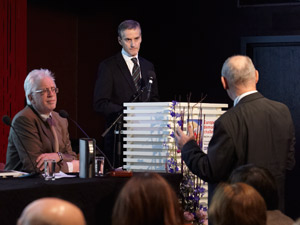
RECON's Scientific Coordinator Erik O. Eriksen and John Erik Fossum discussed the future of European democracy with Norwegian Foreign Minister Støre. (Photo: Annica Thomsson/UiO)
The conference was held at 'Litteraturhuset' in Oslo and attracted close to 200 people. Among the participants were representatives from Norwegian ministries, the Parliament and political parties, diplomatic institutions, local and regional authorities, trade unions and employer's organisations, NGOs and media, as well as students and researchers.
What direction for the European Union?
RECON's Scientific Coordinator, Professor Erik O. Eriksen opened the event with a short introduction of the project in the context of the current crisis. He pointed to the fact that financial speculation and capitalism is global while democracies remain national. The EU could be seen as an experiment in catching up politically with economic globalisation, but much remains for it to be both democratic and efficient in times of crisis.
Eriksen then welcomed the Norwegian Minister of Foreign Affairs, Jonas Gahr Støre, who had been invited to hold a keynote speech on Europe's democratic challenges. Eriksen challenged Støre to give his views on what should be done in Europe today: Should we move towards more democratic supranationalism and less national sovereignty in a time when nation-based democracy is not capable of facing up to aggressive financial speculations, and when euroscepticism and nationalistic sentiments are on the rise? Should more competences and powers be uploaded to the European level or should we rather go forward with some kind of intergovernmental system, which the more recent handling of the eurozone crisis testifies to?
An interconnected Europe
 Norwegian Minister of Foreign Affairs Jonas Gahr Støre held the keynote speech. (Photo: Annica Thomsson/UiO)
Norwegian Minister of Foreign Affairs Jonas Gahr Støre held the keynote speech. (Photo: Annica Thomsson/UiO)
Minister of Foreign Affairs Jonas Gahr Støre emphasized the profound interconnectedness in Europe, within but also beyond the EU and the EEA, and that we are all in the current economic crisis together. He started by reflecting on the current challenges to democracy and economy in Europe.
He stressed first that Europe has the means and institutions to tackle such challenges, as opposed to authoritarian rules, and that this is the real test for a democracy. Moreover, the people must perceive that they are actually able to do so. Based on Keynes, Støre argued that supporting the economy through hard times is right, but that building up a deficit as a systematic strategy over years is another story.
Støre held that politics and democracy are struggling to catch up with the fast-paced, globalized markets. Democratic socieites are also often challenged by historic shifts, he reminded, as exemplified by the debates on enlarging versus deepening of the early 90s. He emphasized that enlargement was a huge achievement. With this the EU gave a major contribution to peace, but the democratisation in Europe still goes on.
In his view, the paradox is that Europe is failing in two areas in which it should excel. First, no-one should be better equipped than Europe to develop a common currency area, with its traditions, skills and economies able to develop the necessary institutions. Despite this, it has not been able to develop suitable technocratic solutions. To keep the common currency, there is a need to fill the institutional gaps on how it should be run, Støre argued.
Second, Europe, which is the cradle of democracy, has failed to ensure the legitimacy of decision-making. In this time of crisis we witness that actions are taken, leaders are held accountable, and decisions are made and contested at the national level. On this background, the key challenge to democracy in Støre's view is the popular lack of trust and confidence in politicians.
Technocratic governments should not be seen as a threat to democracy, he continued, as political majorities have appointed them and their legislation will have to be passed by national parliaments. Støre would rather see democratic parties choose eminent experts to do government business than to see a populist wing coming up with extreme views starting to look for scapegoats.
Støre highlighted Europe's social capital as part of democracy as the most important source to understand the strength of our society. With reference to the Nordic states, he argued that a high level of trust in society is needed to better adapt to a changing international economy and a transformation of the industrial structure. Støre's last observation concerned the need for a highly integrated Europe with strong member states and a strong state structure. Strong states are needed to take care of some of the major support functions in times of transition and change.
The Foreign Minster concluded the question and answer session by saying that he was confident that the European project would not be rolled back. In his view, treaty change is not the way to go forward. The circumstances will force through new ways of changing institutions, he predicted, warning that decisions which would have been inconceivable only a few months ago will be forced through.
A constitutional future for Europe?
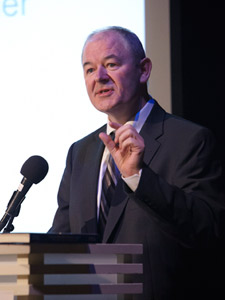 John Erik Fossum spoke on the constitutional future of Europe (Photo: Annica Thomsson/UiO)
John Erik Fossum spoke on the constitutional future of Europe (Photo: Annica Thomsson/UiO)
Professor John Erik Fossum from ARENA began the presentations of RECON's research findings by discussing the constitutional status of the EU. Together with Agustín José Menéndez from the University of León, Fossum has developed a theory of constitutional synthesis in an attempt to devise an explicit constitutional theory for the EU.
What constitution for what kind of Union?, Fossum asked. To answer this, it is necessary to establish what kind of entity the EU is and what kind of constitution such an entity can have. There are different readings of this, he explained. A first approach is to perceive of the EU as an international organisation unfit for a constitution. However, the EU is clearly beyond this, as demonstrated by extensive research from the RECON project.
Does the rejection of the Constitutional Treaty in the 2005 referenda mean that the Lisbon Treaty is a case of constitutional failure? Or are we dealing with a material constitution, but one with weak democratic credentials? These are very different readings of what the EU is, as well as its history and background, he continued.
Fossum outlined three necessary requirements for a fully-fledged constitution. First, it must be formal; it has to be designated as a constitution; second it must be material; it must work in social practice; and third, it must have democratic credentials; people must understand themselves as authors of the law they are subject to.
According to Fossum, the Lisbon Treaty was an attempt to save the Constitutional Treaty. After a secretive and unclear period of reflection, the leaders explicitly said that the legal order could not be understood as a constitution. Yet it functions as one, Fossum argued, and the institutions of the Union still understand it as one. But what credibility can it have as a constitution if the leaders and the member states do not fully acknowledge it as such? The current problem is founded in this tension, Fossum concluded.
A European representative democracy?
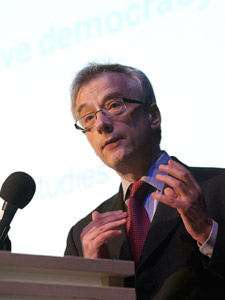 Christopher Lord discussed problems of representative democracy in Europe. (Photo: Annica Thomsson/UiO)
Christopher Lord discussed problems of representative democracy in Europe. (Photo: Annica Thomsson/UiO)
Professor Christopher Lord from ARENA presented selected findings from RECON's research on representation and institutional make-up and discussed the problems of the diverse forms of representation in the European Union after Lisbon.
A claim often made about the EU is that whatever other democratic deficits it may be claimed to have, it does at least combine several different channels of representation. But according to Lord, we cannot be sure that lumping together different forms of representation will add up to good representation. To explore whether different elements of representation combine well in the European arena, RECON has studied representation from a number of different angles.
The project has carried out a democratic audit of the EU, and it has studied how far the European Parliament and national parliaments interact in a 'parliamentary field'. It has also studied the EU party manifestos for the 2009 European Parliament elections, the EU agencies, and finally, the adaptation of the representative institutions of a new member state.
Lord highlighted, first, that representative practices could often be more autonomous at the European level than is suggested by formal hierarchies of political control. Second, actors matter, and not just institutions; the behaviour of individual members of the European Parliament does affect their chances of re-election. MEPs also rarely appeal to purely national considerations in order to justify their arguments.
Third, the public experience of representation in the national arena conditions their perception of the quality of representation at the European level. Fourth, it is comparatively easier to adapt the formal representative institutions of an EU accession country, than it is to adapt the structure of party politics or civil society relations. Finally, Lord emphasized that there are many unresolved questions as to how to combine a form of collective responsibility with a compound form of representation.
Contesting Europe from below
 Ulrike Liebert presented research on contestation of the EU. (Photo: Annica Thomsson/UiO)
Ulrike Liebert presented research on contestation of the EU. (Photo: Annica Thomsson/UiO)
Professor Ulrike Liebert from the University of Bremen looked at how the EU is challenged from below. She presented examples of how the EU is publicly contested: national referendums on EU accession or treaty ratification, media contesting the EU's legitimacy, euroscepticism, European Parliament election campaigns and public intellectual debates about Europe. By undertaking comparative research on these topics, RECON researchers have investigated the role of civil society and the public sphere in reconstituting democracy in Europe.
Findings suggest that national parliaments have become key arenas in EU constitutional and institutional politics, also in terms of public information, communication and debates. While, mainstream political parties contest specific institutional competences and policy reforms, radical and extremist political movements more often contest the legitimacy of the project itself.
According to Liebert, the research points to an emerging transnational pattern where political parties debate Europe at the same time and on the same issues with similar arguments. A European public sphere is emerging. A transnational space of communication can also be identified in the media coverage of EU affairs. A third finding concerns civil society organisations and how they perceive the European order. The differences in their positions on how to strengthen European democracy are conditioned by their conceptions of the EU as a political order, but also by the access they have to influence EU decision-making. Finally, Liebert argued that the 'no demos' thesis, that the EU cannot be a democracy as long as there is no European identity, and no homogeneous and integrated European public sphere, is a misleading assumption.
Liebert concluded that these contestations over Europe are troubling and that they present challenges, but they also contain the seeds of ideas and practices that may show the way out of the present paralysis. They could contribute to developing a new type of European political community with a living democracy, with manifold forums where people can debate European issues, where national democracies are closely linked with European-level democracy, and with opportunities for direct political participation by citizens which complement the current modes of representation. The contestations might thus be interpreted as contributing to a revival of the EU rather than to the fall of the euro zone and the delegitimation of European integration, Liebert argued.
European or national identity?
 Zdzislaw Mach discussed the transformation of identities in Europe. (Photo: Annica Thomsson/UiO)
Zdzislaw Mach discussed the transformation of identities in Europe. (Photo: Annica Thomsson/UiO)
Professor Zdzislaw Mach from the Jagiellonian University in Krakow picked up on the 'no demos' thesis and presented research on changing identities in Europe. He started by discussing how to approach the concept of identity, arguing that it should be perceived as a process of becoming, not as an essentialistic assumption of being based in culture and tradition.
Identity evolves through dialogue and negotiation, Mach stated. He moreover pointed to the mutual relationship between democracy and identity: not only does democracy need a collective identity; if identity is perceived as a process, we also need democracy in order to have identity.
RECON has mainly studied the 'new' member states, and Mach argued that EU enlargement created a new reality in Europe by encouraging mobility and dialogue, which is the essence of a process of identity formation. This has supplemented and reshaped national identities.
Younger generations in particular have developed more diverse and inclusive identities, less defined by the national, but more in regional and international terms. Research findings from Polish cities suggest that people see themselves as belonging to a wider space beyond national borders, and that this has an effect on local and regional identities.
Mach however also warned about the conservative option that arises when younger generations take advantage of the freedom of expression and choice to construct their identity. Global changes and rapid societal transformations may result in mental and material insecurity, which in turn may lead to the emergence of a traditional, and sometimes even religiously fundamentalist or nationalistic identity.
Finally, Mach pointed to research on sexual minorities, which testifies to the fact that also minority groups use the European scene to find security and express their identity. Minorities not only find possible support in European institutions, they also find a new platform for promoting their interests, which may not be available at the national level.
Security - beyond democracy?
 Helene Sjursen discussed the democratic nature of the EU foreign and security policy. (Photo: Annica Thomsson/UiO)
Helene Sjursen discussed the democratic nature of the EU foreign and security policy. (Photo: Annica Thomsson/UiO)
Professor Helene Sjursen from ARENA discussed the possible democratic challenges for the EU's foreign, security and defence policy. This policy field has traditionally been the prerogative of the executive, in line with established practices at the national level. Principled arguments against democratic control of this area is however hard to find in Sjursen's view. Although there may be good reasons to establish secretive procedures, which kind of issues or situations this should apply to should be agreed upon through democratic procedures, she argued.
The RECON research has investigated whether we can still conceive of this policy field as intergovernmental, or whether it has become yet another form of cooperation, and what the democratic implications of this would be. Can national governments be held accountable for what they do in the context of the EU's common foreign and security policy? Is it possible to trace decisions made at the EU level back to democratic authorisation within each individual member state?
Findings suggest that the ability of member states to control decisions is weakened. It is hard to identify who actually decides in this policy field. Key actors are national bureaucrats permanently based in Brussels who make cross-national decisions in a collective manner. And, although the national veto is still formally in place, researchers observe that member states increasingly refrain from using this right, or they change their position, in order to facilitate a common policy. Lastly, the reasons and justifications for policies made also refer to some idea of European values and interests.
According to Sjursen, findings testify to a policy-making process which is something between supranational and intergovernmental. It is a kind of transgovernmental policy area, which it would be difficult to put exclusively in the hands of a federal parliament. Simply strengthening the powers of the European Parliament would therefore not be sufficient in order to reconstitute democracy. There is above all a need to clarify lines of authority and power.
Gender democracy in the EU?
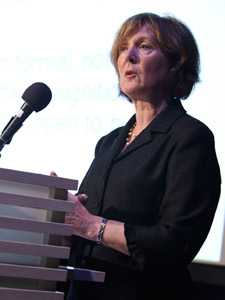 Yvonne Galligan evaluated the status of gender democracy in the EU. (Photo: Annica Thomsson/UiO)
Yvonne Galligan evaluated the status of gender democracy in the EU. (Photo: Annica Thomsson/UiO)
Professor Yvonne Galligan from Queen's University Belfast asked whether gender democracy in the EU is a dream or reality. In a gender democracy, she explained, women's perspectives, voices and interests are fully integrated and recognised, women's spokespersons are held accountable for the positions that they hold, and there is an understanding and respect for the claims to equality expressed by women.
Galligan shared insights from extensive research on the democratic quality of EU decision-making as well as a comparative study of the transposition of EU directives at the national level. At the European level, this research shows that there are multiple access points for the inclusion of women representatives and the expression of women's views. At the national level, however, there is an elitism that leads to the inclusion of women as discretionary rather than necessary.
As for the accountability of women spokespersons at the EU level, reason-giving and justification for positions in the debates are in general highly developed. A very different story is found at the national level. Although deliberations in national parliaments were often characterised by a wide range of views on women's social roles, the issue was often framed around national concerns and the equality content absent. The effect of European norms of gender equality was thus limited.
Gender equality is also recognised as a public good in debates at the EU level, but this common good comes into conflict with sectoral interests, in particular economic imperatives. National deliberations focused on formal, not substantive, compliance with EU norms. Very little recognition was accorded to the issue of equality, which was open to being dismissed.
Galligan concluded that the effects of European integration are limited by the conflict between member states and the EU level which stems from different understandings of gender equality. There is an implicit rejection of EU equality norms at the national level. Finally, when the transposition of EU directives is substantive, it is because equality is part of the national discourse and the transposition is used as a support to the national legislative efforts.
Is the monetary union inadequate?
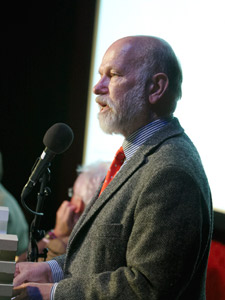 David Mayes spoke on the monetary union. (Photo: Annica Thomsson/UiO)
David Mayes spoke on the monetary union. (Photo: Annica Thomsson/UiO)
Professor David Mayes from the University of Auckland discussed the political economy of the European Union, with a particular focus on the monetary union and the current euro crisis. He asked if the problems are the result of a flawed governance model, or if the model has only been badly executed. Secondly, is the process of trying to solve the crisis changing the nature of European integration and of democracy?
Mayes started by pointing to the reasons why the system has fallen apart. The original idea was a monetary union with considerable economic integration, firm admission hurdles, constraints on imprudent fiscal policy, limited fiscal transfers for the disadvantaged, and encouragement to structural change to ensure flexibility. However, the admission hurdles were not enforced, and the constraints on an imprudent fiscal policy were poorly designed and weakly applied. This has led to limited structural change and hence limited flexibility in some countries. He concluded that he model is workable but that the execution has been flawed.
Mayes continued to discuss whether the economic governance measures launched in 2011 would work. He claimed that there is no room left to manoeuvre for countries in trouble. Due to their high debt levels, the only way of increasing competitiveness is to lower wages. Higher growth is essential to debt reduction, he underlined. The suggested reforms of the Stability and Growth Pact with more emphasis on medium-term growth will improve the game, as will the Euro Plus Pact. To conclude, he argued that fiscal prudence is important, regardless of the regime, and cannot be avoided by an exit from the euro area.
On the question if closer integration is needed, Mayes stated that it would only make a difference if the richer nations were prepared to contribute more, which is to be expected in a currency union. But the current process is still very much asymmetric, and most of the burden lies on the countries in difficulties. If this were a balanced process, it would have a better chance of success.
Constitutionalism beyond the state
 Christian Joerges spoke on constitutionalism beyond the state. (Photo: Annica Thomsson/UiO)
Christian Joerges spoke on constitutionalism beyond the state. (Photo: Annica Thomsson/UiO)
Professor Christian Joerges from the University of Bremen spoke on constitutionalism beyond the state. RECON has studied comparative constitutionalism and the regulation of the economy within and beyond Europe, comparing Europe to the rest of the world. The emerging law in this field not only facilitates trade and opens up markets, it also regulates the economy, and this needs to be explained.
Joerges outlined three schools of thought on constitutionalism beyond the state, and positioned himself in a fourth camp, that of 'constitutional cooperation'. In his view, the important issue is organising cooperation between different units in a normatively sound way. Among the cases studied in depth, Joerges highlighted two studies, which illustrate the tension stemming from decisions taken in the economy being of a highly political nature.
The impact of the opening of markets on the Polish agricultural sector has been analysed, studying laws on Genetically Modified Organisms (GMOs). A tension was found related to the constitutional structure, where the EU imposes laws of equal access to markets without considering the impact on society.
A second study contrasts the European and the international level, and the impact of the World Trade Organization, asking who in the EU are able to take decisions on highly contentious ethical and political issues. Such dilemmas are of constitutional nature because they affect our fundamental values and orientations, as well as important economic and social interest.
A financial and democratic crisis
 Aslak Bonde emphasised that the financial crisis is also an democratic crisis. (Photo: Annica Thomsson/UiO)
Aslak Bonde emphasised that the financial crisis is also an democratic crisis. (Photo: Annica Thomsson/UiO)
The Norwegian independent political analyst Aslak Bonde commented on the findings presented and provided his own take on the current situation. He started by underlining that the financial crisis is also a democratic crisis in that it is a politically made crisis more than an economic crisis. These two issues are deeply tangled together. Turning the conventional claim that economic growth is not possible without democracy, he asked if democracy may not be possible without economic growth?
Bonde drew the attention to the important role of the mass media, and the key trend that media has narrowed the playing ground of politics. While the 'old' journalism took the long view on the news and explained it in context, the 'infotainment' society provides no background analysis but only conflicts, personalisation of politics and crisis maximizing.
He moreover disagreed with the Foreign Minister that what is happening in Greece and Italy is democratic. In this crisis the national parliaments have taken decisions forced upon them from the outside on such a scale and to the extent that they are not expressing a free will. With this as background, Bonde commented that the solution to the crisis might be forced and undemocratic, however, as there has been no public debate, the alternative might not be better.






